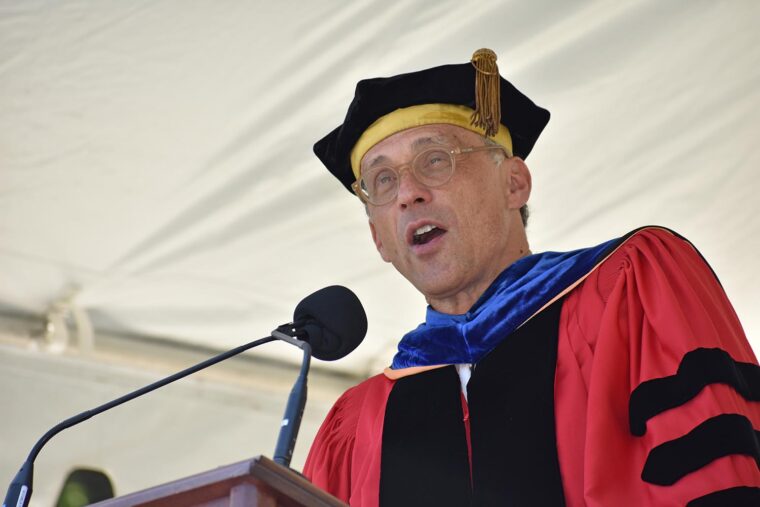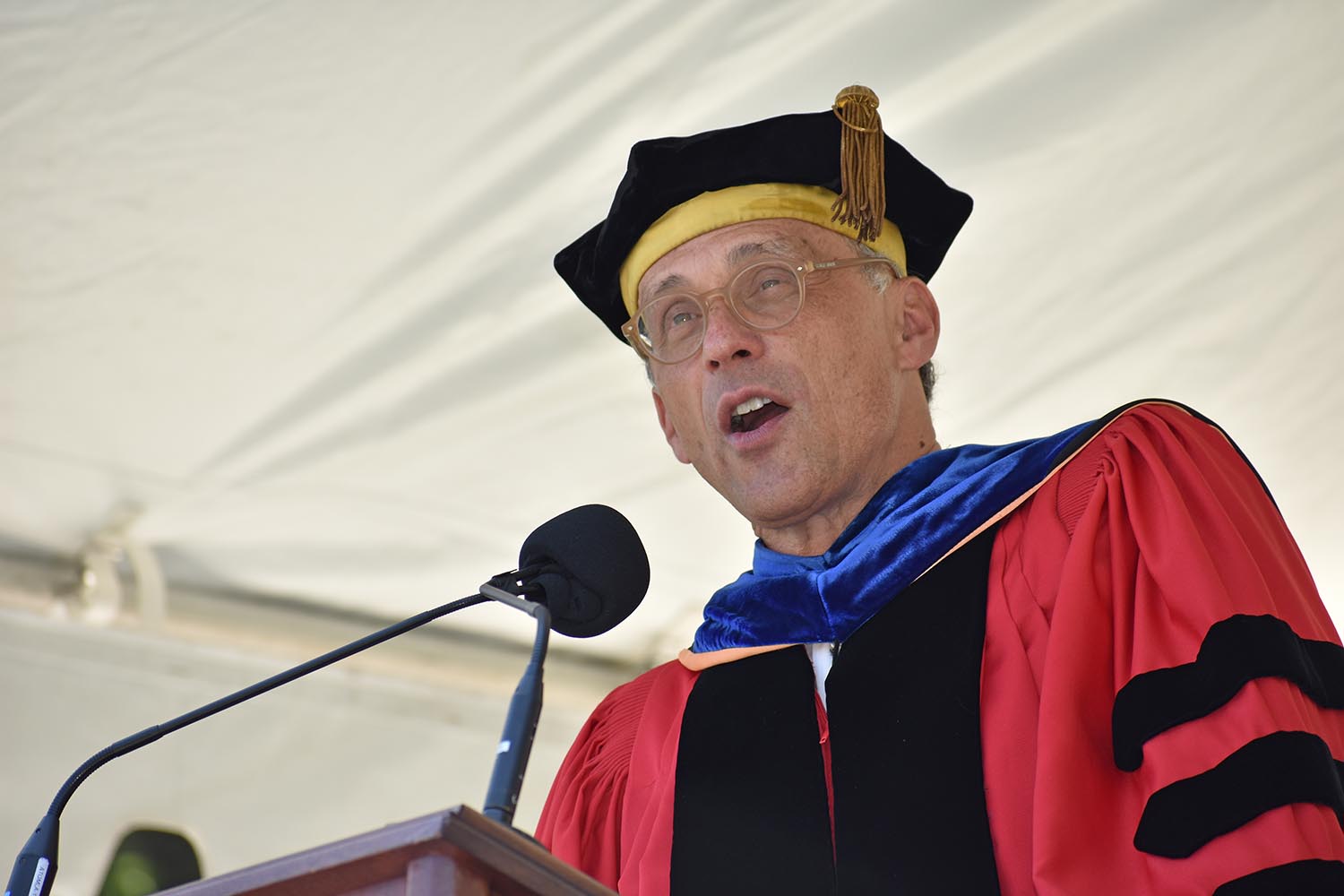In Commencement Address, President Roth Expresses Pride in “Courageous” Class of 2021


From an excitement-filled Arrival Day to the unpredictable final three semesters of campus life that unfolded during the COVID-19 pandemic, “so much has changed in your lives since you were first introduced to Wesleyan,” President Michael Roth ’78 said in his remarks to the graduating Class of 2021, who sat in front of him on Andrus Field in a socially distanced 189th Commencement.
Besides the obvious impacts of the pandemic, Roth was referring to social and political divisiveness in the country, which has increased in recent years, “exacerbated by” irresponsible media platforms. “Attacks on those considered ‘outsiders’ are a sick symptom of this addiction to outrage,” he said, “but so are the insidious tendencies of many to stop listening to people they deem to be failing some sort of political litmus test.”
Yet, Roth said, “we should take heart from the efforts made by so many across the country, and right here on campus, to rebuild trust, to create caring communities.” Reminding the graduates that “we are counting on you” to take on “new challenges beyond the university,” Roth expressed pride in—and awe for—the Class of 2021.
“In your courageous company I feel we may well be able to reject the cynical status quo that mobilizes rage, that we may be able to build a politics and a culture of compassionate solidarity rather than of fear and divisiveness,” he said.
The full text of President Roth’s address (as prepared) is below:
Wesleyan students are known for their ability to look beyond the obvious to discover what really makes things work. At the same time it is easy to take certain things for granted. Ever since Arrival Day, Dean Mike Whaley and his team have had your interests at the center of their professional lives. Dean Rick Culliton has led our pandemic response committee with diligence and compassion. Behind the scenes here on campus, and often with not enough acknowledgment, are the hard-working staff of Wesleyan University. They get the job done with dedication and good cheer. I am very grateful for their efforts and I ask you to join me in thanking them.
Introducing you to the diverse worlds of scholarship, research and creative practice has been the task—and the joy—of your teachers at Wesleyan. Your professors, the marvelous Wes faculty, have combined energy and expertise to inspire you to develop your capacities even as they pursued their own exemplary research and artistic practices. As you make your way in the world, I trust you will remember their extraordinary efforts. With courage, perseverance and good humor, they keep idealism alive as an effective endeavor. Make them proud, and join me in thanking them, your teachers at Wesleyan!
Although the pandemic has limited visits with our families and friends this year, we all know how important they were to making it possible for you, our graduates, to be here today. It takes a mighty network of support, and often great sacrifice, to send a student to Wesleyan and to help them to the finish line. Please join me in acknowledging the families and friends, the support networks, of our graduates.
I wonder if you can recall the excitement, nervousness, and anticipation you felt when you first arrived on campus? Meeting your roommates for the first time, getting your first pail from WesWings, discovering field hockey, or musical theater, advanced digital humanities or non-traditional burlesque? So much has changed in your lives since you were first introduced to Wesleyan, and so much has changed in the life of our country; as everyone has remarked, we have grown ever more polarized. Divisiveness is being exacerbated by media platforms whose irresponsibility is baked into their business models. Like the producers of addictive painkillers, these platforms stimulate anger and hate, and then create antidotes, new messages to help people channel (or more likely, stoke) their rage. Attacks on those considered “outsiders” are a sick symptom of this addiction to outrage, but so are the insidious tendencies of many to stop listening to people they deem to be failing some sort of political litmus test.
As sad as all this may be, we should take heart from the efforts made by so many across the country, and right here on campus, to rebuild trust, to create caring communities. One such community is woven together by the Center for Prison Education, which has been working with incarcerated men and women for the last several years. Today we celebrate our first cohort of incarcerated and returning citizens who have earned their bachelor of liberal studies. I want to pause and acknowledge the men at Cheshire who are watching this ceremony.
Whether it is through the Center for Prison Education, environmental advocacy or tutoring in the local schools, I so admire Wesleyan students’ contributions to reknitting fabrics of trust. Going forward, some of you will bring analytic skills to the public sphere so as to better understand patterns of change and inertia. Others will use your storytelling abilities to create narratives that help us better understand who we are and who we want to become. Some of you will collaborate in large teams of people from various backgrounds, using the skills of creatively leveraging diversity that you have developed in your co-curricular activities, or perhaps in your project-based courses.
I am hopeful that at Wesleyan you have cultivated an openness to being persuaded to change your mind—to seek out those from whom you can gain new perspectives and ideas precisely because they don’t share your point of view. I know we joke about a Wesleyan bubble, but we also should have learned how permeable the borders are between the campus and the world of which it is a part. A university is a place to have one’s ways of thinking tested—not just protected. If we are to repair our public life, we must develop habits of mind and spirit that allow us not just to celebrate our differences from mainstream culture but to learn how to positively impact it.
One of the reasons I love being president of our school is that I learn so much from the enthusiasms, the convictions, and the reasoned arguments of our students. Over the last four years, I have been schooled by students who have faced up to the immense challenges of combating climate change around the globe and pervasive racism here at home. I have also listened closely to those of you for whom religious practice is fundamental, and I have discussed with conservative students their concern that personal freedom can be eroded by policies that seem to have the best of intentions. Sure, I have also seen and sometimes exhibited stubborn close-mindedness, but on our best days, we are able to explore our differences without fear and work toward positive change with courage.
Now, as you take on new challenges beyond the university, we are counting on you—to reject the dismissal of norms for telling the truth and the labeling of anything one doesn’t like as fake or inappropriate; counting on you to protect the freedom to think for oneself and to speak one’s mind, especially in situations where people disagree; counting on you to show others the power of listening to those with whom you have conflicts. We are counting on you to move beyond accumulating online followers to earning the respect of strangers—turning them into neighbors, companions, teammates.
Over these four years, I have gotten to know many of you in my classes, in student government, and even in a few demonstrations. In your courageous company I feel we may well be able to reject the cynical status quo that mobilizes rage, that we may be able to build a politics and a culture of compassionate solidarity rather than of fear and divisiveness. After all, generations of Wesleyan alumni have benefited from this campus culture characterized by brave, practical idealism. As I say each year, we Wesleyans have used our education for the “good of the world,” lest the future be shaped by those for whom justice and change, generosity and equality, diversity and tolerance, are too threatening.
Class of 2021, we have already seen what you are capable of when you have the freedom and the tools, the mentors and the friendships, the insight and the affection to go beyond what others have defined as your limits. I have cheered you on as you succeeded in competitions—from debates and hackathons to Little Three crowns and NESCAC Championships. I have been awed by your creativity in song and science, technology, and theater. I have been deeply grateful for the cooperation you have shown throughout this pandemic. We know that in the years ahead you will explore unfamiliar realms and see possibilities that others might not. We know that you will find new ways to make connections across cultural borders—new ways to build community. When this happens, you will feel the power and promise of your education. And we, your Wesleyan family, we will be proud of how you keep your education alive by making it effective in the world.
It’s been nearly four years since we unloaded cars together at the base of Foss Hill, four years since parents shed (or maybe hid) a tear as they drove away. It seems like a short time ago. Now, here on campus or wherever this message finds you, please remember that you will always be members of the Wesleyan family. Wherever your exciting pursuits take you, please come home to alma mater. Come home often to share your news, your memories, and your dreams. Good luck!

